| August 20, 2020 -
No. 55 Alberta
Government Intensifies Attacks on Workers' Rights Join
Mobilizations Which
Defend the Rights of All!  
•
Review of Alberta's Occupational
Health and Safety Legislation
• Occupational Health and
Safety: The Experience of Cargill Workers
• Fraudulent Review of
Workers' Compensation
• Workers' Compensation
Legislative Review 2020
Defend the Rights of All • Montreal
Demonstration for Regularization of Status of All Essential Workers
• Cross Country August 23 Day of Action
Demands Status for All
Alberta
Government Intensifies Attacks on Workers' Rights 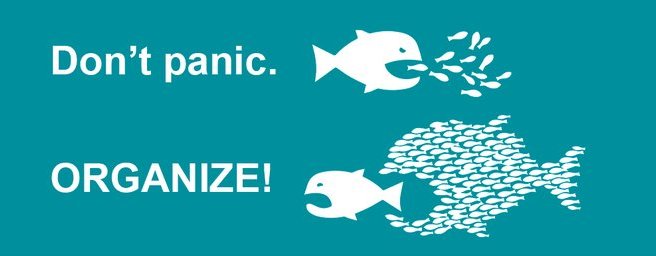
In the middle
of summer in the midst of a global
pandemic, the Alberta government launched a major assault on working
people through the review of two major pieces of labour legislation,
the Occupational Health and Safety Act (OHS
Act) and the Workers' Compensation Act.
The review was launched only a few days after
the same government introduced Bill 32, Restoring Balance in
Alberta's Workplaces Act, 2020, which passed on July 29.[1] Workers'
Forum is providing information about the
review of both the OHS Act and Workers'
Compensation legislation.
Everything in the government review is to attack workers' rights,
dignity and voice, and to serve the narrow private interests of the
rich employers who constantly complain of red tape and administrative
burdens when
it comes to health and safety at the workplace. 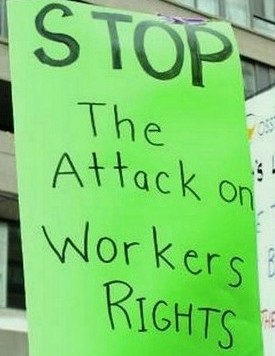 Close attention
has to be paid to the process and methods through which the government
is abdicating the responsibility of the state to care for the health
and safety of all. The process systematically concentrates power in the
hands of the executive to dictate a course of action which is partisan
to narrow private interests. To finagle the passage of its anti-worker
legislation, in both these cases, as well as for the passing of Bill
32, the government posted online surveys and guides for written
submissions all of which are processed behind closed doors. It calls
this process "consulting" with the people. Close attention
has to be paid to the process and methods through which the government
is abdicating the responsibility of the state to care for the health
and safety of all. The process systematically concentrates power in the
hands of the executive to dictate a course of action which is partisan
to narrow private interests. To finagle the passage of its anti-worker
legislation, in both these cases, as well as for the passing of Bill
32, the government posted online surveys and guides for written
submissions all of which are processed behind closed doors. It calls
this process "consulting" with the people.
The OHS Act introduction to
the survey says, "Your feedback will
help us determine what changes may be needed in the OHS Act
to improve
processes for employers and workers." The form of
the survey is a set of questions for
respondents to answer. Written submissions were also accepted. Neither
the results of the surveys nor the written submissions are to be made
public but rather become the private property of the Ministry of Labour
and Immigration. The questions the review asked are
manipulative,
suggesting that any recognition of rights and any protection of the
workers must be eliminated as a block to economic recovery and
employers who are called "job creators." The OHS
Act survey closed on August 12 and has since
disappeared. No one who responded has been able to look at their own
responses or change or complete the survey after that date. Instead
they received a terse email: "This survey is closed. Thank you for your
interest." Workers consulted by Workers' Forum say
they expect that now manipulated responses will suddenly appear and be
cited to reinforce any anti-worker changes contained within the
legislation. The times call for public discussion,
formal consultations and presentations. These are not mere formalities
but comprise a prelude to governments introducing legislation or
amendments to legislation which can be perceived as being legitimate
and fair. The process the government is using is self-serving and
perceived to constitute outright attacks on the rights of working
people in the name of expediency in reopening the economy. It
is becoming increasingly evident that narrow private interests are
dictating the removal of any limitations on the rich becoming richer.
They dictate that no former institution, organization, tradition or way
of proceeding with government work must be allowed to stand in the way
of serving their private interests.  This creates a
most dangerous situation for workers'
working and living conditions and their right to a say over issues that
affect their lives. In fact, the seizure of the government executive by
powerful private interests threatens the society as a whole and the
people's capability to identify problems and present their views and
pro-social
solutions and to claim what is theirs by right. The private interests
that have seized control of the government executive want to sweep away
any hindrance to becoming richer and more powerful at the expense of
the people including their health and safety. This creates a
most dangerous situation for workers'
working and living conditions and their right to a say over issues that
affect their lives. In fact, the seizure of the government executive by
powerful private interests threatens the society as a whole and the
people's capability to identify problems and present their views and
pro-social
solutions and to claim what is theirs by right. The private interests
that have seized control of the government executive want to sweep away
any hindrance to becoming richer and more powerful at the expense of
the people including their health and safety.
Alberta
workers are mobilizing against this attempt to silence them and trample
on their rights. Workers' Forum is
calling upon all Canadian workers to join these mobilizations to fight
for the rights of all and hold the Kenney and similar governments to
account for their anti-worker and anti-social activities. Through
mass mobilization, working people can defend
their dignity, defeat these attacks on their rights and open up a path
for their voice and needs to become decisive in the affairs of society.
Note For more information on Bill 32,
read Workers'
Forum July 30, 2020. 
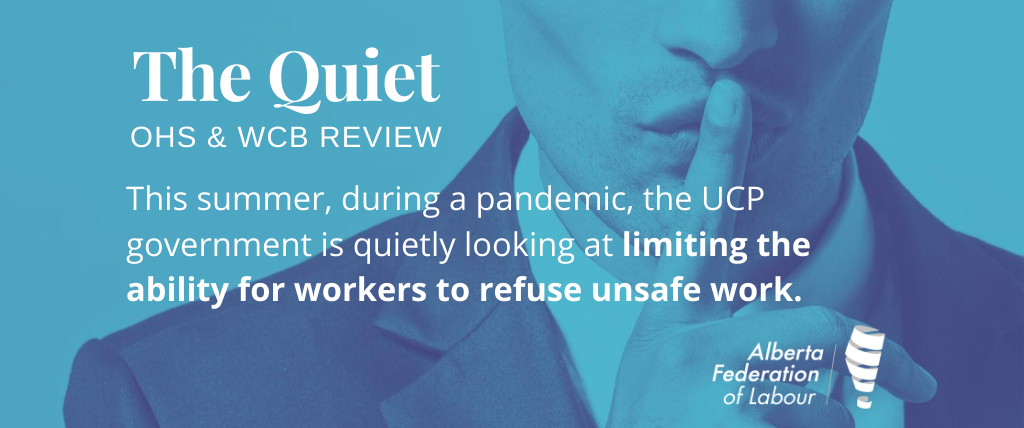
The Occupational Health and Safety
Act (OHS Act) is a
major component of Alberta labour legislation. The Act states that its
purpose is the promotion and maintenance of the highest degree of
well-being of workers, the prevention of worksite incidents, injuries,
illnesses and diseases, and the protection of workers from factors and
conditions
adverse to their health and safety. According to the Act, workers have
three basic rights regarding their health and safety: the right to know
about workplace hazards that may impact their health and safety; the
right to participate in health and safety matters in the workplace; and
the right to refuse work which is unsafe or which they are not
competent to do safely. The review of the
OH&S legislation was conducted
through a survey with questions provided by the Ministry of Labour and
Immigration. In the introduction of the survey, the Ministry states its
intention to make major changes to the Act to lessen the prescriptive
nature of the Act to give more flexibility and responsibility to the
parties at
workplaces. The document says: "While legislation
establishes and
sets basic standards, the government is responsible to develop and
enforce the law but not manage OHS in individual workplaces.
Legislation sets the framework to ensure the health and safety of a
work site through the direct participation of work site parties."
In fact, the entire survey is based on a desire of
employers and contractors to lessen what they consider regulatory and
prescriptive burdens so they can trample on those rights of workers
that are formally recognized in the Act. Here are a
couple of examples. Joint Health and Safety
Committees
The OHS Act prescribes
that
an employer must establish a joint work site health and safety
committee if the employer employs 20 or more workers and work is
expected to last 90 days or more. The Ministry
finds this clause of the Act to be too
restrictive for the parties and inhibits the parties' ability to act
with innovation and flexibility at the work place. The solution
proposed by the Ministry is the introduction of the concept of "low
risk work site" in the Act. On such sites, the requirement for a joint
OHS committee would not
apply. The survey asks respondents to comment on the conditions under
which a work site could be declared a "low risk work site." It
is important to keep in mind that whatever responses
the Ministry receives to this question are not provided in any form so
are not subject to public scrutiny. It is a pragmatic manoeuvre to
justify the changes that the Ministry and the private interests want to
make. The fact that such a question is even raised in the midst of the
global
COVID-19 pandemic, where there is clearly no such thing as a "low
risk" site, shows the self-serving and dishonest nature of government
executives and the financial oligarchs and that the aims of what they
are attempting to impose on society are anti-social. It shows too that
the refusal to hold public discussions on how serious problems facing
society can be provided with solutions is harmful to society. The fact
is that no matter what problems face a society, alternatives which are
safe are within our reach. It is not a foregone conclusion that people
have to die from COVID-19 or any other pandemic. They can be protected
and the economy does not have to be shut down. But none of this is
discussed. Right to Refuse Dangerous
Work
Another major example is the
issue of dangerous work and
a worker's right to refuse dangerous work, a basic right that is
formally recognized by the Act.
The introduction states, under the subhead "Right
to refuse":  "The right to
refuse is intended to address situations
where the right to know and the right to participate have failed to
address a health and safety concern. In Alberta, workers have the right
to refuse work that presents a danger. Employers cannot penalize
workers for refusing to work or otherwise complying with their
obligations under the
OHS Act. A worker may refuse work that may endanger
themselves.
However, the OHS Act does not define 'danger' or
place
limitations on refusals where other workers or the public may be
endangered. Providing more clarity in the OHS Act
will help balance the
protection of workers and others who may be impacted by a work refusal." "The right to
refuse is intended to address situations
where the right to know and the right to participate have failed to
address a health and safety concern. In Alberta, workers have the right
to refuse work that presents a danger. Employers cannot penalize
workers for refusing to work or otherwise complying with their
obligations under the
OHS Act. A worker may refuse work that may endanger
themselves.
However, the OHS Act does not define 'danger' or
place
limitations on refusals where other workers or the public may be
endangered. Providing more clarity in the OHS Act
will help balance the
protection of workers and others who may be impacted by a work refusal."
The survey has these questions under the "Right to refuse"
subhead: "1. How can 'danger' be better defined to
provide more clarity as to when the right to refuse unsafe work applies?
"Are there circumstances in which the right to refuse unsafe
work should be limited? Please explain and provide examples. "How
can the process outlined in the OHS Act be
streamlined to provide work site parties with more flexibility to
address work refusals in the workplace." The right
to address unsafe conditions with a refusal to work is negated when
governments pass laws which decree that a work site is safe. The
attempt is to make any refusal of what an individual or a union or
other collective considers unsafe illegal. First, no public opinion is
created to justify the foundation of a law which is passed. Then, if an
individual or collective takes action based on their conscience of how
they discern their interests are served, they are criminalized. The
levels of confusion, anxiety, anarchy and violence soar as a result.
The fact is that in a modern society it is the responsibility of
governments to protect the polity and all its members and insist that
employers do likewise no matter who they be. The same duty falls on
every member and collective of society. If governments abdicate their
responsibility and protect employers who also abdicate their
responsibility then it is the duty of individuals and their defence
organizations to step in. That governments are making it illegal to do
so merely shows the kind of battle the workers have in front of them.
It reveals the need for workers to hold forums amongst themselves where
they can discuss how these matters pose themselves, so that no one is
forced to fend for herself or himself without the weight of their peers
organized to back them up.
Today, taking stands
for what is just requires upholding principles as a matter of right.
Upholding the dignity of labour, opposing the anti-social agenda to pay
the rich, fighting for the rights of all, are all positions of
principle which open the path for a society which advances by
humanizing the natural and social environment. The working people must
establish for themselves the principled basis for their demands and
unite their peers in action to realize them. 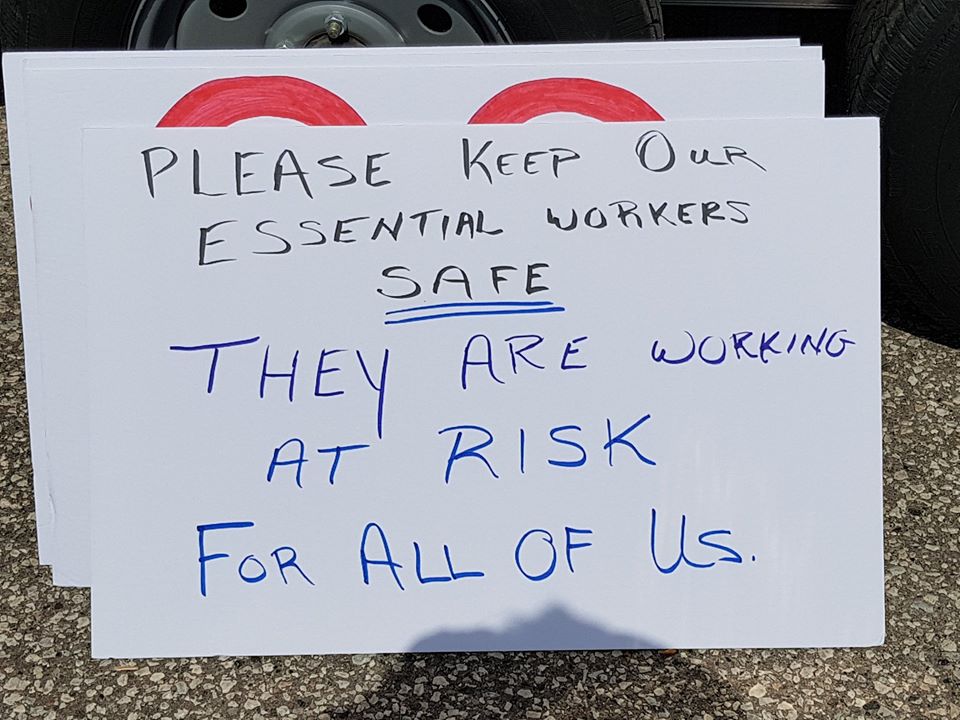 The government
executive seems to want to take the route
of the Harper government which, in 2014, amended the Canada Labour Code
so that the Minister of Labour, who is bound by the code to investigate
the exercise of a right to refuse, may decide not to investigate if the
Minister considers that the matter is trivial, frivolous or vexatious,
or that the continued refusal to work is in bad faith. In that case,
the worker who refused to do the unsafe work is considered to be in
contravention of the Labour
Code and is penalized. The government
executive seems to want to take the route
of the Harper government which, in 2014, amended the Canada Labour Code
so that the Minister of Labour, who is bound by the code to investigate
the exercise of a right to refuse, may decide not to investigate if the
Minister considers that the matter is trivial, frivolous or vexatious,
or that the continued refusal to work is in bad faith. In that case,
the worker who refused to do the unsafe work is considered to be in
contravention of the Labour
Code and is penalized.
The Harper
government also introduced a new definition
of danger in the Labour
Code, which says that a danger is "any hazard,
condition or activity that could reasonably be expected to be an
imminent or serious threat to the life or health of a person exposed to
it before the hazard or condition can be corrected or the activity
altered." The
imminence of the threat is what was added. Who decides the limitations
on the right to refuse unsafe work is critical because it is on this
basis that judgements are made to vindicate or penalize a person or
collective for exercising their right to refuse unsafe work. When a
minister or government usurps the power to decide whatever they want in
a manner that they cannot be held to account by those who are affected
by the decision, and when everything becomes a matter of litigation in
courts of law and the decisions reached by the courts are also
manipulated, it is a sure sign of tyranny. The
questions posed on the matters of concern with regard to occupational
health and safety are all self-serving and of a calibre to make sure
the government and employers cannot be held to account as concerns what
constitutes duties as defined and required by a modern democratic
society. They reveal a government intent on further abdicating its
social responsibility and permitting employers to do likewise.
Attacking workers' rights in the name of flexibility and reopening of
the economy is not acceptable. The very idea of using a survey as a
consultation on matters of life and death, especially at this time of
the COVID-19 crisis, is unacceptable and should be opposed.

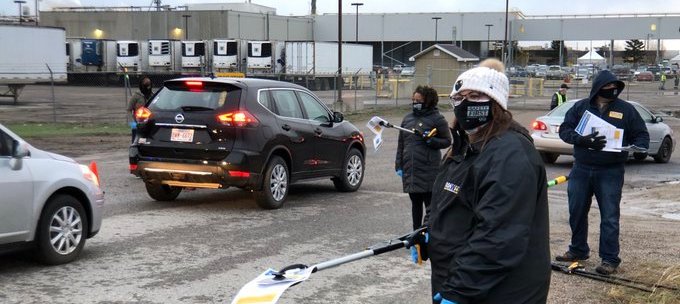
When
the Cargill plant in High River re-opened after a COVID-19 outbreak it
was the workers' union, UFCW Local 401 which met the
returning workers
with masks and safety information.
Under current
legislation in Alberta, Occupational
Health and Safety (OH&S) is responsible for enforcing
compliance
with provincial legislation. The legislation states enforcement is
through "education, work site inspections, and other enforcement
measures" including "proactive inspections and responding to complaints
and incidents at
provincially regulated workplaces." The Alberta
government's recent review of OH&S
legislation is based on neo-liberal mantras that speak about the need
for "flexibility," to rid the legislation of "burdensome" and
"over-prescriptive" regulations that inhibit "innovation." A central
aim of the review is to smash any public authority responsible for
establishing and enforcing
standards in the public interest and replacing it with rule by narrow
private interests. 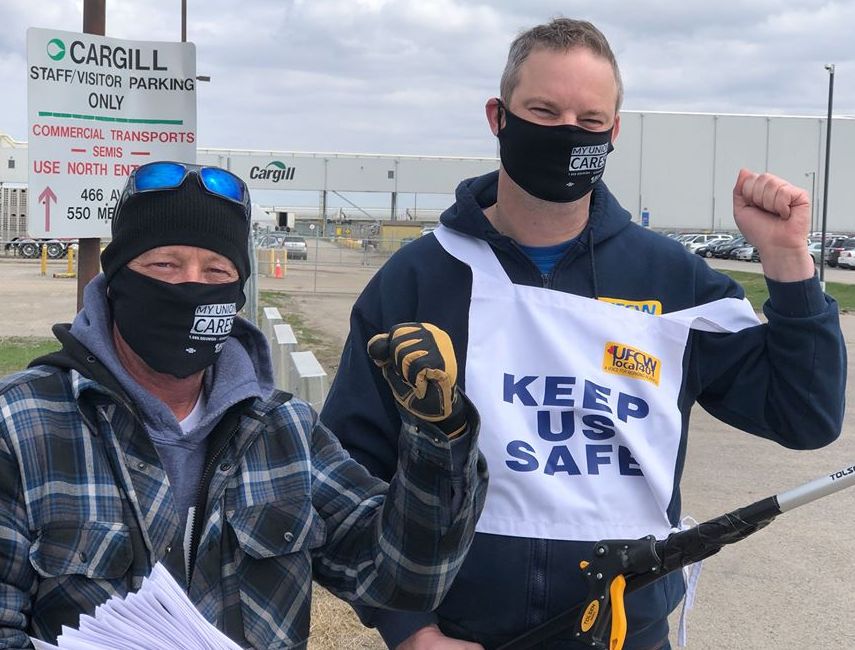 The experience of
workers at the Cargill meat packing
plant in High River, Alberta and their community reveals what such an
aim and catch-phrases and self-regulation serving private interests
mean in real life. Not until hundreds of workers tested positive for
COVID-19 with many becoming sick and two workers and a family member
dying
from the virus did OH&S finally "inspect" the worksite. It did
not
inform the union of the inspection as required by law; it did not speak
to a single worker and did not inform or convene the worksite
OH&S
Committee. No one from OH&S actually went into the plant. The
"inspection" was carried out by Cargill management who showed the
OH&S inspectors part of the plant with a video camera, at a
time
when the kill floor was not even operating. The experience of
workers at the Cargill meat packing
plant in High River, Alberta and their community reveals what such an
aim and catch-phrases and self-regulation serving private interests
mean in real life. Not until hundreds of workers tested positive for
COVID-19 with many becoming sick and two workers and a family member
dying
from the virus did OH&S finally "inspect" the worksite. It did
not
inform the union of the inspection as required by law; it did not speak
to a single worker and did not inform or convene the worksite
OH&S
Committee. No one from OH&S actually went into the plant. The
"inspection" was carried out by Cargill management who showed the
OH&S inspectors part of the plant with a video camera, at a
time
when the kill floor was not even operating.
Despite
the claims of "everyone" being involved in the
inspection, the company called the shots. It actively worked to exclude
the workers and the union from even receiving information, never mind
upholding their right to participate in making decisions about health
and safety issues. OH&S followed the
directives of a premier who was hell bent on keeping the meat packing
plants open. It imposed no penalties on Cargill for what is widely
perceived by Albertans as gross negligence. OH&S concluded
everything was fine and did not order the plant to shut down to avoid
contagion until such a time alternatives were put in place which
protect the workers within that specific working environment.
The actions of the workers and their union finally
forced Cargill to act, albeit reluctantly. For as long as it could,
Cargill resisted implementing the measures the UFCW Local 401 proposed.
It resisted closing the plant, and pressured workers to return to work
during the quarantine period. As a consequence, almost 1,000 workers
tested positive,
two workers and a family member died, and the virus was transmitted to
many in the community who became sick as well. Throughout
the stressful ordeal, government has
permitted Cargill to act with impunity. The organized resistance of the
workers, their affirmation of their right to refuse unsafe work, their
courage in speaking out and exposing the conditions at Cargill, and the
determined work of UFCW Local 401 finally forced the company to shut
down and
to bring in the safety standards and equipment they demanded, which
brought the pandemic under control at the plant.  To
working people, the problem with current health and safety at the plant
and throughout Canada is clear. Consultations are phony, warranted
conclusions about the matter at hand are not drawn or seen to be drawn,
and decision-making power has been usurped by narrow private interests.
From the vantage point of those who hold class privilege and wield
power to serve their narrow private interests, laws are needed which
impede any resistance whatsoever on the part of the workers.
Ruling elites say the problem is with workers who are lazy, greedy or
unreasonable and blame them and their actions for endangering the
safety of others, the economy and so on. They say that exceptional
times require exceptional measures which justify the removal of
regulations that are "over-prescriptive," "burdensome" and so on. They
declare "flexibility" is required to remove obstacles to "innovation."
The more excuses they give, the more the need to remove them from
office in favour of those who bring in a pro-social agenda is revealed. To
working people, the problem with current health and safety at the plant
and throughout Canada is clear. Consultations are phony, warranted
conclusions about the matter at hand are not drawn or seen to be drawn,
and decision-making power has been usurped by narrow private interests.
From the vantage point of those who hold class privilege and wield
power to serve their narrow private interests, laws are needed which
impede any resistance whatsoever on the part of the workers.
Ruling elites say the problem is with workers who are lazy, greedy or
unreasonable and blame them and their actions for endangering the
safety of others, the economy and so on. They say that exceptional
times require exceptional measures which justify the removal of
regulations that are "over-prescriptive," "burdensome" and so on. They
declare "flexibility" is required to remove obstacles to "innovation."
The more excuses they give, the more the need to remove them from
office in favour of those who bring in a pro-social agenda is revealed.
Exceptional circumstances require that standards and protocols in fact
be upheld and used to find a way forward. To remove them willy nilly in
the name of high ideals is in fact the prescription for anarchy,
violence and terrorism, not security, coherence and unity of the people
to face the dangers calmly. As it stands what is required today is to
strengthen health and safety protocols to protect workers, their
families and communities and the country as a whole.
Cargill workers have emerged from this ordeal with
a
heightened sense of their collective strength to defend their rights.
They are remaining pro-active and vigilant to ensure safety precautions
continue to be implemented. By speaking out and defending their rights,
Cargill workers have drawn attention to problems existing long before
the
pandemic, conditions that threaten their health, safety and well-being.
They are demanding, in essence, the right to have an effective voice
and
the power to decide what serves the interests of working people and the
broad interests of society. 
The Alberta government on August 14,
closed the window
for submissions to its Workers' Compensation Legislative Review 2020,
which began on July 10. The government carried out the entire exercise
like a thief in the night. On July 10 the Ministry of Labour and
Immigration posted a "written submission guide" for the review with a
30-day timeline for submissions, without either a press release or
a public announcement. 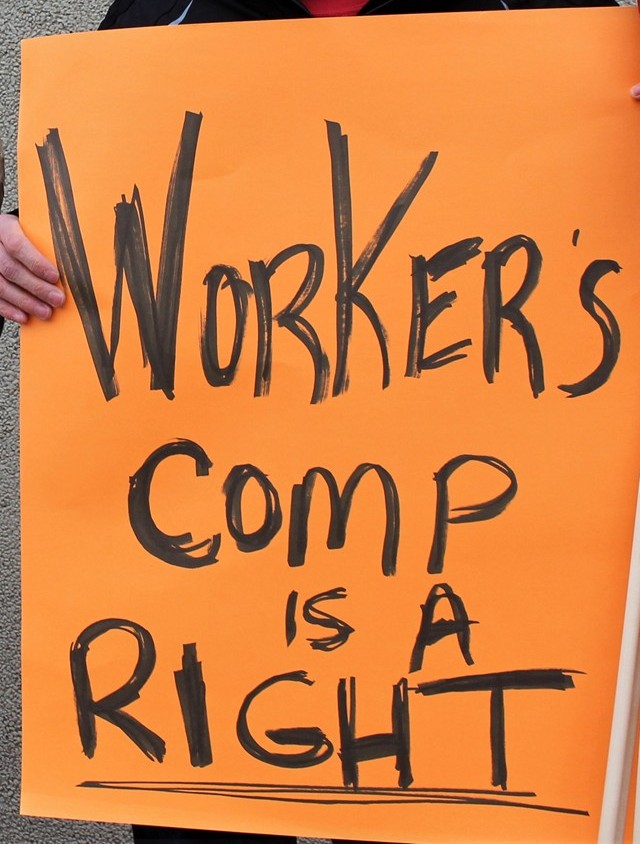 The review
document states, "The [Workers' Compensation
System] must remain sustainable, affordable, and fair in order to
benefit workers and employer, both now and in the future." The review
document states, "The [Workers' Compensation
System] must remain sustainable, affordable, and fair in order to
benefit workers and employer, both now and in the future."
The
review states that an extensive review of the
Workers' Compensation Act
and system took place in 2016 and 2017, and
substantial changes were made to the Act and system in 2018,
implementing many of the recommendations of the review panel. The guide
then states, "Since implementation, several stakeholders have raised
concerns
about the affordability, sustainability, and administrative burden of
the new system." Buzz-words of the anti-social offensive such as
"stakeholders," "sustainable," "reducing administrative burden" and
"cutting red tape" are used to cover up the aim of making changes to
the compensation system that experience has shown are totally
unsustainable as concerns the health and safety of the population and
the natural environment. The workers' compensation
system was a "historic
compromise" in which workers gave up the right to sue their employer if
they were injured or became ill in the course of their work in return
for being looked after when they were injured. Under the system,
workers cannot sue their employers, yet many injured workers are pushed
to the
margins of society and forced to fend for themselves. They often have
to
rely on social assistance or Assured Income for the Severely
Handicapped (AISH). This violates the rights of workers and permits
employers to evade and deny their responsibilities. The
online survey presented 19 topics that respondents were asked to
discuss and give opinions. From the topics provided for discussion, the
United Conservative Party is clearly responding exclusively to
complaints and demands of "stakeholders" -- i.e. narrow private
interests, to reduce benefits and reduce or eliminate the
responsibility of employers for injuries to workers and unhealthy
working conditions. The problems of small employers which could be
provided with solutions are mixed up with the refusal of the
conglomerates to take up their social responsibilities.
The pandemic has brought to light the urgency to meet
the demands of injured workers for a workers' compensation system that
provides every worker who is injured or becomes sick as a result of
their work, full coverage for the entire time they are unable to work.
Alberta experienced the largest outbreak of COVID-19 in
workplaces in all Canada. At Cargill alone, 981 workers tested positive
with more than 1,500 cases linked to the plant. It is said that this
was the largest outbreak in any plant in North America but in fact
reporting from the U.S. meat packing and other plants is yet to be
properly rendered. 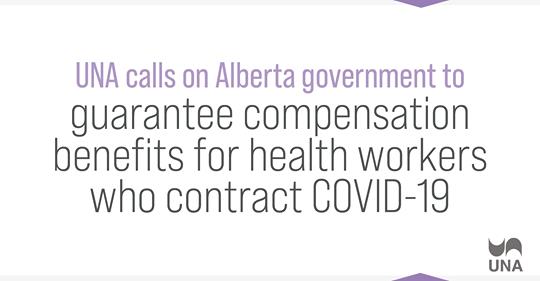 Health
care workers and workers in food production and
processing have been and are at much greater risk of contracting
COVID-19 than the general population. Many problems facing workers with
compensation claims have been in need of correction for a long time.
The COVID-19 pandemic has revealed even more -- as shown by the
situation in health care and food processing -- the pressing need for
pro-social reform. Health
care workers and workers in food production and
processing have been and are at much greater risk of contracting
COVID-19 than the general population. Many problems facing workers with
compensation claims have been in need of correction for a long time.
The COVID-19 pandemic has revealed even more -- as shown by the
situation in health care and food processing -- the pressing need for
pro-social reform.
The reopening of Alberta schools
has also shone a light
on the fact that Alberta teachers are not covered by workers'
compensation. Moreover, the
situation for substitute teachers is extremely precarious, as they not
only have no Workers' Compensation coverage, but no paid sick leave or
disability
benefits.This is a situation that must be addressed and remedied
without delay. The review that the Alberta
government conducted for the benefit of the global oligarchs who want
to have free rein to trample on the rights of workers to healthy and
safe working conditions is clearly designed to make sure the workers
cannot act as an organized force to defend their rights and the rights
of all. It has nothing to do with a discussion on what is needed to
protect human beings and their society. The foregone conclusions that
the government's questions and methods prompt will not make the
government legislative agenda legitimate. The process does not confer
the consent of the governed. It must not pass! Workers
have rights as the producers of all wealth, and
the only legitimate objective of a review of the workers' compensation
system would be to ensure that the rights of workers are upheld. The
aim must be workers' compensation for injury and suffering work-related
health problems, not employers' compensation. 
Written
Submission Guide Questions The guide asks for
opinions on 19 issues, most of which
pertain to changes made to Workers' Compensation Board (WCB)
legislation in 2018. In many instances, a space for respondents
indicates whether they want to keep the status quo, modify a benefit or
condition, or eliminate it altogether.
Workers' Forum
Summarizes the Issues in the Review
- Earnings Cap: WCB
benefits are now based on 90 per cent of
earnings with no cap. Should a maximum insurance earnings cap be
reinstated? - Cost
of Living: Cost of Living (COLA) adjustments now provide
full COLA. Should they be reduced? - Presumptive Coverage:
Should presumptive coverage for
traumatic psychological injuries be retained, removed or modified? When
a worker is diagnosed with a psychological injury following one or more
identified traumatic events in the workplace, the injury is presumed to
be work-related unless proven otherwise. The guide states that as a
result of this change, the number of claims accepted for traumatic
psychological injuries has increased by 40 per cent. -
Health Benefits:
Should employers be required to continue health benefits for workers
while on WCB? - Interim
Relief: Should Interim relief for hardship
available to workers and employers be continued or removed from
legislation? The guide reports 98 requests for interim relief while
awaiting a decision, 96 from workers and 2 from employers, with only 15
requests granted. - Reinstatement of Injured Workers:
Should employers be
obligated to reinstate injured workers when they are ready to return to
work? The information provided suggests that the government may exempt
small employers and impose a post-accident time cap. It notes the
employer's legal duty to accommodate, and that a worker's only recourse
is through a human rights complaint, which take an average of 793 days
to resolve in Alberta. - Termination of Modified Work:
The guide notes that
some stakeholders are demanding that a worker fired for cause should
lose their WCB benefits. The comments in the guide indicate that the
Ministry is not interested in pursuing this particular, obviously
illegal, proposal. - Should all fund "surpluses" be
returned to employers?
The surplus is defined as the amount in excess of the fully-funded
ratio (114-128 per cent). Surpluses can now be used for health, safety
and
disability management initiatives, as well as being returned to the
employer. - Request
for reconsideration: 2018 legislation
introduced a three-step process for reconsideration of the decisions of
the Appeals Commission. Should the legislation revert to a one-step
process? - Time
Limits for Appeals: Workers now have two years to
appeal a decision of the WCB review board to the Appeals Commission.
Should the time limit remain or revert to one year? -
Benefit of the Doubt:
This language was added in 2018.
The guide suggests the change was not substantive and does not need to
be revised. - Industry
Associations: Should legislative oversight of
the seven industry health and safety associations funded through
mandatory dues paid by employers be retained or is such oversight
"intrusive?" - Occupational
Injury and Disease Advisory Committee:
The Committee was established in 2018, at which time the list of
occupational injuries and diseases had not been updated for four
decades.
Should it be retained or removed? - Choice of an Independent Medical
Examiner: A worker
can now choose an independent medical examiner from the roster
maintained by the Medical Panels Office rather than being assigned a
doctor. The guide suggests this does not cause delays or problems
however it neglects to mention that a worker's ability to choose is
quite often a farce
since in some
specialties only one physician is on the roster. - Selection of WCB Board and WCB
Review Panel: The Board
and periodic review Panel are now chosen from nominations put forward
by organizations representing workers, employers and the public. The
comments indicate that the government plans to return to selection by
government alone. The final question is, "Do you
have any suggestions for
streamlining the Act and associated regulations for reducing red tape,
regulatory and/or administrative burdens, while still supporting
injured workers?" 
Defend
the Rights of All 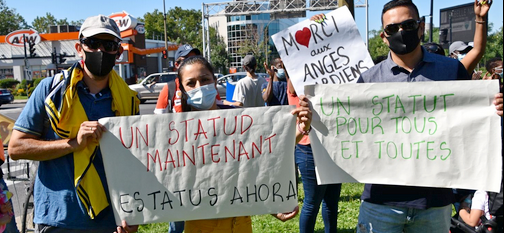
Montreal
Saturday,
August 22 -- 10:00 am
Ministry of
Immigration, Francization and Integration
1200 Saint-Laurent
Blvd
Facebook Stand Up for Dignity
invites you to come out and join us. This
demonstration is part of the
intensification of our actions until the federal and provincial
governments reconsider their
position and propose a regularization program that includes ALL
essential workers who have
sacrificed themselves for Quebec and Canada during the pandemic.

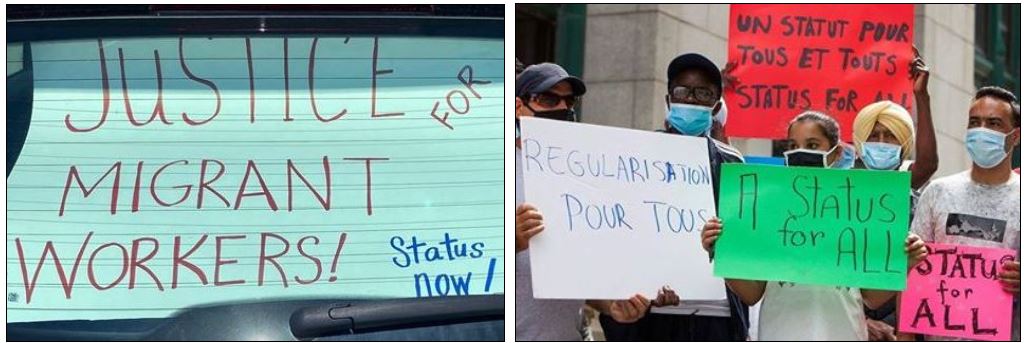
The
ruling elite have concocted categories of people based on
state-determined criteria -- citizens, permanent residents, temporary
workers seeking permanent status, temporary workers with no right to
seek permanent status, guest foreign workers, foreign students with and
without the right to seek permanent status who pay huge sums to study
in Canada and have the right to work while they study, undocumented
workers in a state of legal or civil death, and others. The division of
the people into these categories allows the ruling elite to
super-exploit those accorded fewer rights, a situation that is
exacerbated by the COVID-19 pandemic. These divisions serve to deprive
the people of a consciousness of what is happening which, in turn,
seeks to weaken the resistance of the working class and its ability to
defend all its members.
On August 23, join with
working people
across the country to take a bold stand in defence of the rights of
all! Full and permanent immigration status for all. No more racism, no
more deaths, no more exploitation, STATUS NOW!
SIGN THE PETITION: here.LEARN MORE: here.
Sherbrooke
2:00-4:00
pm
Constituency
Office of MP Élisabeth Brière,
1650 Rue
King Ouest
Facebook
Montreal
2:00-5:00
pm
Festive
marches will take place in four neighbourhoods:
Parc Ex,
Montréal Nord, Côte des neiges and downtown.
Facebook
Ottawa
2:00-3:00
pm
Immigration
and Refugee Board, 344
Slater St.
Facebook
Toronto
2:00-4:00
pm
Immigration
and Refugee Board and the
Canada
Border Services Agency Offices, 74 Victoria St.
Facebook
Niagara
1:00
pm
Niagara
Detention Centre, 1355 Uppers Lane
Facebook
Windsor
3:00-5:00
pm
Immigration
and Refugee and Canada Border Services Agency Offices,
1250 Walker
Rd.
Facebook
Regina
1:00
pm
Constituency
Office of MP Michael Kram,
2723 East
Quance St.
Facebook
Vancouver
3:00-5:00
pm
Citizenship
and Immigration Offices, 877 Expo Blvd.
Facebook

(To
access articles individually click on the black headline.) PDF
PREVIOUS
ISSUES | HOME
Website:
www.cpcml.ca
Email: office@cpcml.ca | 
